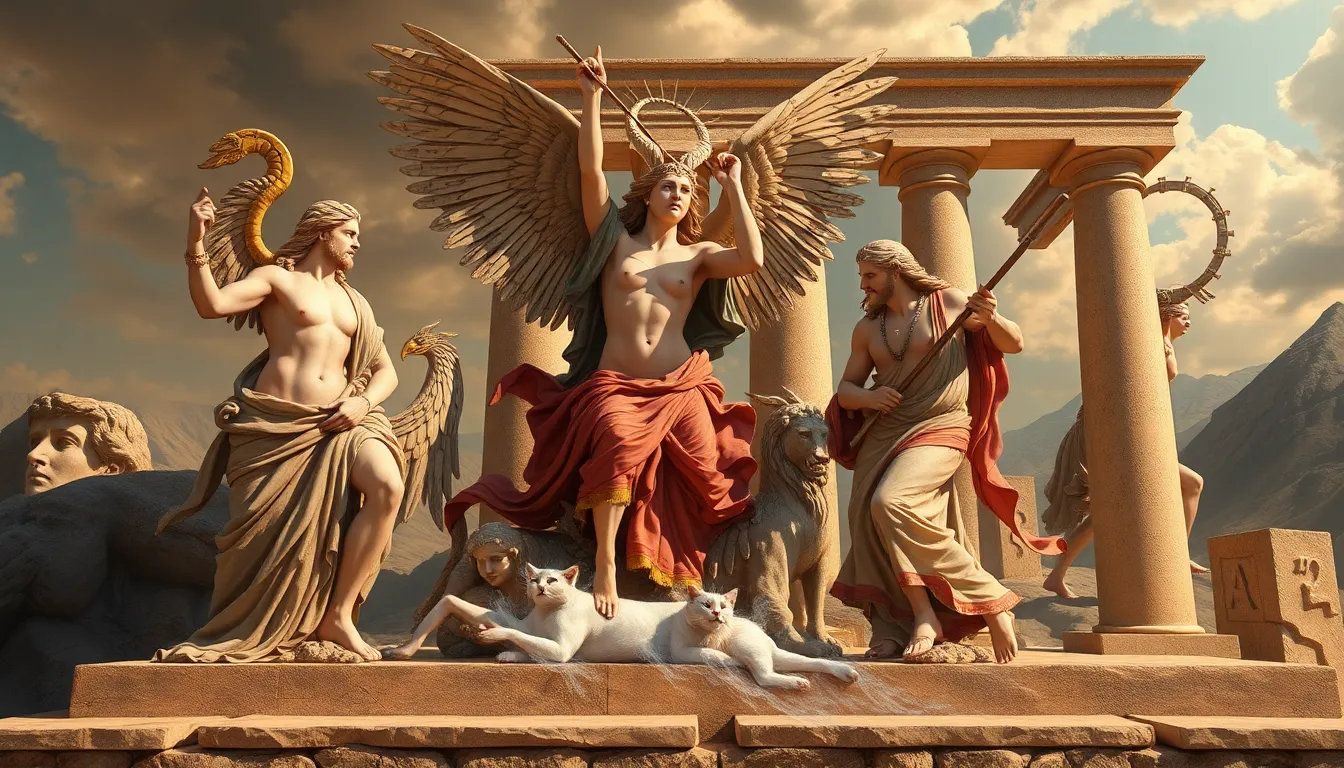The Role of Divine Retribution in the Myths of the Muses
I. Introduction
Divine retribution in mythology refers to the concept where the gods impose punishment or justice upon mortals for their actions, often as a response to hubris or disrespect. This theme is prevalent in Greek mythology, where the gods are not only powerful but also maintain a moral order that mortals must respect.
The Muses, nine goddesses of the arts and inspiration, play a significant role in Greek mythology. Each Muse represents a different aspect of the creative arts, inspiring humans to create and express themselves. However, they also wield the power of divine retribution, ensuring that mortals honor the arts and the divine.
This article explores the interplay between divine retribution and the narratives surrounding the Muses, highlighting how their influence shapes artistic expression and moral lessons in mythology.
II. The Muses: Guardians of Arts and Inspiration
The Muses are often depicted as beautiful maidens, each embodying a specific domain of the arts:
- Calliope: Epic poetry
- Clio: History
- Erato: Love poetry
- Euterpe: Music
- Melpomene: Tragedy
- Polyhymnia: Sacred poetry
- Terpsichore: Dance
- Thalia: Comedy
- Urania: Astronomy
The significance of the Muses extends beyond mere inspiration; they represent the divine connection to creativity. In ancient Greek culture, the Muses were invoked at the beginning of artistic works, as artists sought their blessings to create masterpieces.
III. Understanding Divine Retribution in Greek Mythology
Divine retribution serves as a key theme in Greek mythology, illustrating how the gods maintain moral order. It often manifests in the form of punishment for those who exhibit hubris—excessive pride or defiance against the gods. Examples of divine retribution include:
- The punishment of Niobe, who was turned to stone for boasting about her children.
- The fate of Arachne, transformed into a spider for challenging Athena.
- The downfall of Icarus, who flew too close to the sun, causing his wings to melt.
The moral framework of Greek mythology emphasizes respect for the gods and adherence to social and ethical norms. Disrespecting this order often leads to dire consequences, reinforcing the belief that the divine oversees human affairs.
IV. The Muses as Instruments of Divine Retribution
The Muses are not only sources of inspiration but also agents of divine retribution. There are several instances where the Muses enact punishment upon mortals who fail to honor the arts or the gods:
- In the case of Marsyas, the Satyr who challenged Apollo to a musical contest, the Muses witnessed his hubris and supported Apollo in punishing Marsyas.
- Arachne, a talented weaver, dared to compare herself to the goddess Athena, leading to her transformation into a spider by the Muses, who were aligned with Athena’s judgment.
These myths illustrate a balance between inspiration and punishment, where the Muses ensure that artistic expression is rooted in humility and respect for the divine.
V. Case Studies: Myths Involving the Muses and Retribution
A. The story of Marsyas
Marsyas, a Satyr, found a flute discarded by Athena and learned to play it beautifully. His pride led him to challenge Apollo, the god of music, to a contest. The Muses judged the contest, ultimately siding with Apollo. Marsyas lost, and as punishment for his hubris, Apollo flayed him alive, a gruesome reminder of the consequences of challenging the divine.
B. The tale of Arachne
Arachne, a mortal weaver, boasted that her skills surpassed those of the goddess Athena. Insulted, Athena challenged her to a weaving contest. Although Arachne created a beautiful tapestry, she depicted the gods in a negative light. The Muses, witnessing her disrespect, supported Athena, who transformed Arachne into a spider, condemning her to weave for eternity.
C. Examination of lesser-known myths
Beyond Marsyas and Arachne, numerous lesser-known myths also reflect the themes of divine retribution associated with the Muses. For example:
- The tale of Linos, a musician who was killed by Apollo for his pride in his musical abilities.
- The story of the Maenads, who drove the poet Orpheus to madness for his disrespect towards the divine.
VI. Thematic Analysis: Art, Inspiration, and Justice
Divine retribution significantly influences artistic expression, serving as a cautionary tale for artists and creators. The narratives surrounding the Muses convey essential moral lessons:
- Art must be created with humility and respect for the divine.
- Hubris can lead to dire consequences, both for individuals and their art.
- The balance between creativity and moral responsibility is crucial in the pursuit of inspiration.
These themes resonate throughout the myths, reinforcing the idea that creativity is intertwined with ethical considerations and respect for the divine.
VII. Cultural Impact: Divine Retribution in Later Interpretations
The influence of the Muses and divine retribution extends beyond ancient Greece, impacting later literature and art. The themes of pride, punishment, and justice resonated with Renaissance artists and writers, who often drew inspiration from classical mythology.
Modern reinterpretations of the Muses frequently explore the complexities of creativity and morality, reflecting contemporary discussions about the responsibilities of artists in society. The narratives highlight the enduring relevance of these themes, as they continue to shape our understanding of art, inspiration, and moral order.
VIII. Conclusion
In summary, the interplay between the Muses and divine retribution reveals a profound relationship between creativity and moral order in Greek mythology. The Muses serve as both sources of inspiration and agents of punishment, ensuring that mortals respect the divine and the arts.
These narratives hold lasting significance, inviting reflection on the role of art in society and the moral responsibilities of artists. As we explore the stories of the Muses, we are reminded of the delicate balance between creativity, inspiration, and the consequences of hubris in the rich tapestry of Greek mythology.




